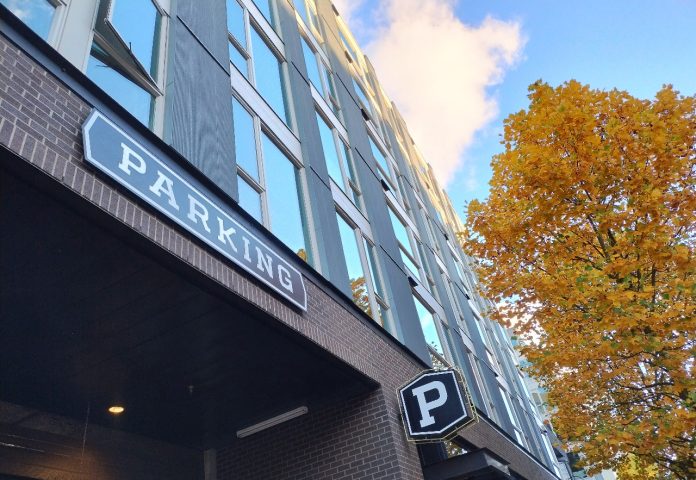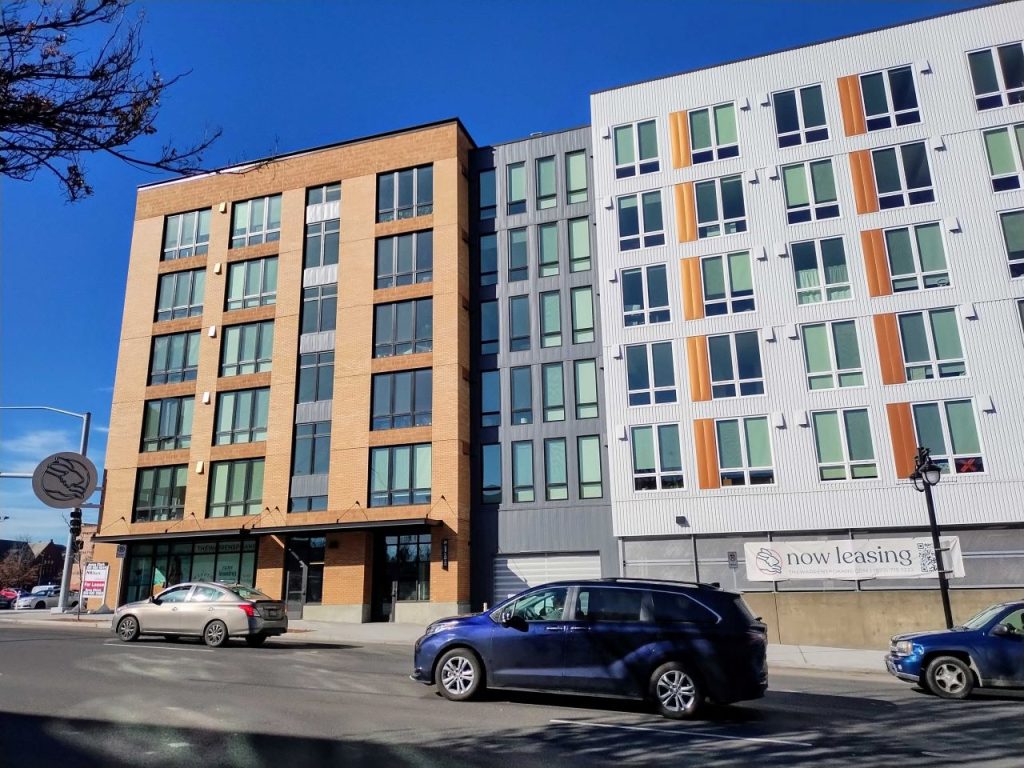
If the Parking Reform and Modernization Act introduced this week at the state legislature is able to advance, Washington’s cities could be severely limited in their ability to mandate copious parking as part of new residential and commercial development. Senator-elect Jessica Bateman (D-22nd, Olympia) introduced the proposal as Senate Bill 5184, formally capping almost all minimum parking requirements for both residential and commercial uses. And it would ban local governments from being able to require any parking in a wide array of cases, apart from what is required under the Americans with Disabilities Act (ADA).
Under the bill, no city could require more than one parking stall for every single new house or apartment, nor more than one stall for every 1,000 square feet of commercial space, with counties and the state’s largest cities restricted to one stall for every two housing units.
That new standard would be significantly lower than those in place in many cities around the state; for example, Lake Forest Park requires new apartment buildings to include one-and-a-half stalls for every single home, even near transit. The same goes for commercial spaces, with the City of Newcastle currently requiring one stall for every 100 square feet of public-facing restaurant space.
“When we look at having a 21st century approach to building housing, ideally you would not have a arbitrary requirement of requiring parking for building a home or constructing a business,” Bateman told The Urbanist this week, days before she is sworn in as a state senator. “We do have that, and in most cities, they require you have at least one parking space for every dwelling unit. The problem with that is some people don’t have cars. Some people don’t want cars. If you have a multifamily housing project where you have 50 apartments and every apartment is required to have a parking space, the people that don’t have cars are actually paying for something that they’re not even using.”
The United States has built two billion parking spots for roughly 200 million cars – a ratio of 10 parking spots for every single car, according to estimates by Donald Shoup, who wrote the 2005 book The High Cost of Free Parking. All this extra parking is hugely detrimental to the environment, contributing to the urban heat island effect and toxic runoff that damages ecosystems.
On top of new citywide ceilings on parking mandates, Bateman’s bill goes even further, banning localities from being able to require any parking in broad number of instances where it may be adding prohibitive costs, including for subsidized affordable housing, smaller residential units (below 1,200 square feet) and commercial spaces (below 5,000 square feet), senior housing and housing for people with disabilities, child care facilities, and commercial spaces in mixed-use buildings. It would also ban parking mandates for any facilities that serve alcohol, responding to the crisis around impaired driving in the state.
The Parking Reform and Modernization Act wouldn’t stop there. It would also force the elimination of parking mandates in areas within a half-mile of a frequent transit line, within all cities with populations over 10,000 in the state’s most urban areas. That section builds on restrictions on requiring parking close to major transit facilities that were included in Bateman’s 2023 middle housing bill, HB 1110.

While these changes would represent a major shift away from how many jurisdictions currently regulate parking, they wouldn’t actually go as far as some cities in Washington have gone in recent months, with both Spokane and Port Townsend completely dropping mandated parking for almost all uses in 2024, and Bellingham and Shoreline set to follow close behind. Those cities, in turn, are following the lead of other major US cities like Portland, Minneapolis, Saint Paul, Austin, and San Francisco in dropping mandated parking from their code and allowing builders to instead gauge market demand and make their own choices when planning projects.
Meanwhile, Washington’s largest city is set to double down on parking mandates in the latest draft of the One Seattle Comprehensive Plan, requiring off-street parking even near some of the city’s most frequent bus lines. That represents a big step back from Seattle’s earlier role as a parking reform leader, providing an opening for bold state action.
Bateman’s bill is not the first time that a bill proposing statewide parking mandate reform has been put forward, with Representative Julia Reed (D-36th, Seattle) introducing a bill in 2023 eliminating parking mandates near transit. That bill was approved by a House committee, but never saw a floor vote.
But things have changed significantly when it comes to local conversations around parking, and the added cost that mandates add to housing projects. A recent study looking at the potential impact of housing reforms in Colorado found that reducing parking mandates could have increased the number of homes by 41%. Reed told The Urbanist that the moves taken by Spokane and Port Townsend have started to influence the frame of the debate around parking.
“I think the more cities that implement parking reform and don’t go through a carmageddon collapse, as forecast by many of those parking minimum prophets of doom, if you will, I think that only bolsters the case for statewide parking reform,” Reed said.
But Reed also noted it’s hard for state legislators, especially those who have not been directly involved in local government, to fully get on board with the idea of forcing cities to adopt lower parking mandates.
“It can be hard to help members understand: what does parking minimum reform really mean,” Reed continued. “What will that look like on the ground for their constituents? And folks are standing up for folks in their community who really need parking, And that’s fine. Parking minimum reform is not about eliminating parking. It’s about eliminating arbitrary parking requirements that cause a lot of expense for housing and commercial construction and don’t contribute that much to our civic landscape.”
Bateman’s bill will likely face strong push back from city and county governments wary of ceding any local control, including the Association of Washington Cities (AWC). In 2023, AWC opposed Reed’s bill due to “significant restrictions of city authority to regulate parking.” In testifying in opposition, AWC’s lobbyist in Olympia, Carl Schroeder has used the argument that even in Seattle, only 19% of households don’t own any vehicles, according to US Census statistics. But advocates for parking reform note that many of the arbitrary limits that local governments have kept in place for decades have little to do with actual parking demand.
If Washington is ready to take steps to prioritize homes over cars, the result will make a big difference in allowing homebuilders to have a crucial tool in addressing the state’s housing crisis.
“We need the flexibility, because we need more housing, and we need to be making decisions about how housing lasts for 50 years,” Bateman said. “This is a decision about the type of future that we want.”
Ryan Packer has been writing for The Urbanist since 2015, and currently reports full-time as Contributing Editor. Their beats are transportation, land use, public space, traffic safety, and obscure community meetings. Packer has also reported for other regional outlets including BikePortland, Seattle Met, and PubliCola. They live in the Capitol Hill neighborhood of Seattle.

